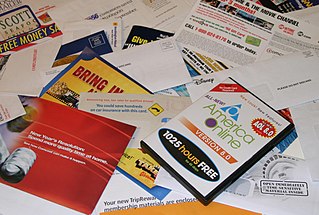Related Research Articles

Telemarketing is a method of direct marketing in which a salesperson solicits prospective customers to buy products, subscriptions or services, either over the phone or through a subsequent face to face or web conferencing appointment scheduled during the call. Telemarketing can also include recorded sales pitches programmed to be played over the phone via automatic dialing.
The National Do Not Call Registry is a database maintained by the United States federal government, listing the telephone numbers of individuals and families who have requested that telemarketers not contact them. Certain callers are required by federal law to respect this request. Separate laws and regulations apply to robocalls in the United States.

Direct marketing is a form of communicating an offer, where organizations communicate directly to a pre-selected customer and supply a method for a direct response. Among practitioners, it is also known as direct response marketing. In contrast to direct marketing, advertising is more of a mass-message nature.
Junk faxes are a form of telemarketing where unsolicited advertisements are sent via fax transmission. Junk faxes are the faxed equivalent of spam or junk mail. Proponents of this advertising medium often use the terms broadcast fax or fax advertising to avoid the negative connotation of the term junk fax. Junk faxes are generally considered to be a nuisance since they waste toner, ink and paper in fax machines.

Advertising mail, also known as direct mail, junk mail, mailshot or admail, letterbox drop or letterboxing (Australia), is the delivery of advertising material to recipients of postal mail. The delivery of advertising mail forms a large and growing service for many postal services, and direct-mail marketing forms a significant portion of the direct marketing industry. Some organizations attempt to help people opt out of receiving advertising mail, in many cases motivated by a concern over its negative environmental impact.

The Telephone Consumer Protection Act of 1991 (TCPA) was passed by the United States Congress in 1991 and signed into law by President George H. W. Bush as Public Law 102-243. It amended the Communications Act of 1934. The TCPA is codified as 47 U.S.C. § 227. The TCPA restricts telephone solicitations and the use of automated telephone equipment. The TCPA limits companies or debt collectors from calling clients or prospective customers using automatic dialing systems, artificial or prerecorded voice messages, SMS text messages, and fax machines. It also specifies several technical requirements for fax machines, autodialers, and voice messaging systems—principally with provisions requiring identification and contact information of the entity using the device to be contained in the message.
Email marketing is the act of sending a commercial message, typically to a group of people, using email. In its broadest sense, every email sent to a potential or current customer could be considered email marketing. It involves using email to send advertisements, request business, or solicit sales or donations. Email marketing strategies commonly seek to achieve one or more of three primary objectives: build loyalty, trust, or brand awareness. The term usually refers to sending email messages with the purpose of enhancing a merchant's relationship with current or previous customers, encouraging customer loyalty and repeat business, acquiring new customers or convincing current customers to purchase something immediately, and sharing third-party ads.
A do not call list or do not call registry is a list of personal phone numbers that are off-limits to telemarketers in some countries. Do not call lists may also be held privately by a company, listing numbers that they will not call.
The National Do Not Call List (DNCL) is a list administered by the Canadian Radio-television and Telecommunications Commission (CRTC) that enables residents of Canada to decide whether or not to receive telemarketing calls. It was first announced by the Government of Canada on 13 December 2004.
The term opt-out refers to several methods by which individuals can avoid receiving unsolicited product or service information. This option is usually associated with direct marketing campaigns such as e-mail marketing or direct mail. A list of those who have opted out is called a Robinson list.
The Junk Fax Prevention Act (JFPA) of 2005, Pub. L.Tooltip Public Law (United States) 109–21 (text)(PDF), 119 Stat. 359 (2005), was passed by the United States Congress and signed into law by President George W. Bush on July 9, 2005. The law amends the Communications Act of 1934, significantly altering some aspects of prior amendments made by the Telephone Consumer Protection Act of 1991 and the CAN-SPAM Act of 2003 as they relate to the issue of junk fax.

Cold calling is the solicitation of business from potential customers who have had no prior contact with the salesperson conducting the call. It is an attempt to convince potential customers to purchase either the salesperson's product or service. Generally, it is referred as an over-the-phone process, making it a source of telemarketing, but can also be done in-person by door-to-door salespeople. Though cold calling can be used as a legitimate business tool, scammers can use cold calling as well.
The Telephone Preference Service (TPS) is the United Kingdom's official do not call list. It allows businesses and individuals to opt out of unsolicited marketing calls.
A squeeze page is a landing page created to solicit opt-in email addresses from prospective subscribers.
A robocall is a phone call that uses a computerized autodialer to deliver a pre-recorded message, as if from a robot. Robocalls are often associated with political and telemarketing phone campaigns, but can also be used for public service or emergency announcements. Multiple businesses and telemarketing companies use auto-dialing software to deliver prerecorded messages to millions of users. Some robocalls use personalized audio messages to simulate an actual personal phone call. The service is also viewed as prone to association with scams.
The Data & Marketing Association, also known as the DMA, is a trade organization for marketers. In 2017 their web site stated "Yes, 100 years ago we were the Direct Mail Marketing Association and then the Direct Marketing Association. Now we embrace …"
The Australian national Do Not Call Register scheme was set up in Australia to regulate the activities of telemarketers who make unsolicited telephone calls to private individuals or who send unsolicited faxes. The scheme is free and applies to home, mobile or fax numbers. A number of categories of organisations are exempt from the Register prohibitions, including government bodies, registered political parties, MPs, political candidates, charities and educational organisations. As of April 2013, the Register had 8.5 million numbers listed.
Nuisance calls encompass any type of unwanted, unsolicited, telephone call. Common types of nuisance calls include prank calls, telemarketing calls, and silent calls. Obscene phone calls and other threatening calls are criminal acts in most jurisdictions, particularly when hate crime is involved.
Interruption marketing or outbound marketing is promoting a product through continued advertising, promotions, public relations and sales. It's the opposite of permission marketing. It is considered to be an annoying version of the traditional way of doing marketing whereby companies focus on finding customers through advertising.
Unsolicited advertisement comprise all of, but are not limited to:
References
- ↑ Krafft, Manfred; Hesse, Jürgen; Höfling, Jürgen; Peters, Kay; Rinas, Diane (2007-10-14). International Direct Marketing: Principles, Best Practices, Marketing Facts. Springer Science & Business Media. p. 134. ISBN 978-3-540-39632-1.
- ↑ "Ditch the direct mail?". Ministry of Consumer Affairs. 19 May 2008. Archived from the original on 14 May 2010. Retrieved 5 February 2010.
- ↑ Pilcher, Pat (21 October 2008). "Spam vs junk mail - which is the lesser evil?". The New Zealand Herald . Retrieved 30 October 2011.
- ↑ "Telemarketing - What can you do?". Consumer NZ. 1 October 2007. Archived from the original on 2 May 2010. Retrieved 5 February 2010.
- ↑ "Robinsonlist". Robinsonlist.be. Retrieved 2013-10-30.
- ↑ "Consumers' Choice program" . Retrieved 2023-10-24.
- ↑ "How to reduce the amount of advertising mail you receive" . Retrieved 2023-10-24.
- ↑ "ASML - Data & Marketing Association of Finland". www.asml.fi. Retrieved 2022-09-27.
- ↑ "Registro Pubblico delle Opposizioni" [Public Registry of Oppositions] (in Italian). Retrieved 2017-04-03.
- ↑ "Servicios de Listas Robinson". Listarobinson.es. Retrieved 2012-07-31.
- ↑ "Mailing Preference Service". mpsonline.org.uk. Retrieved 2022-03-24.